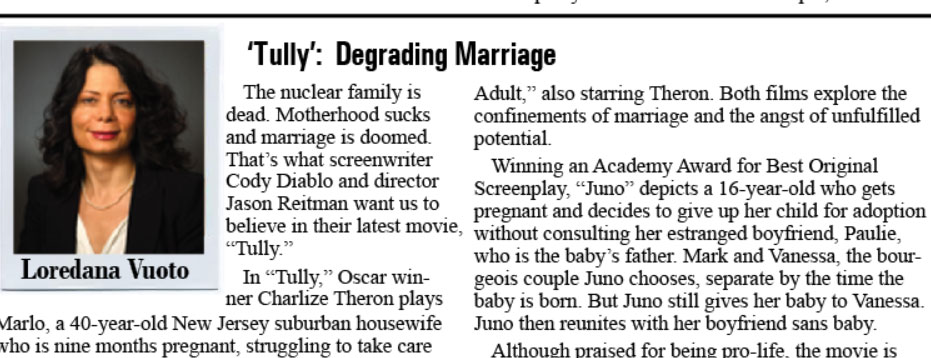By Loredana Vuoto
The nuclear family is dead. Motherhood sucks and marriage is doomed. That’s what screenwriter Cody Diablo and director Jason Reitman want us to believe in their latest movie, “Tully.”
In “Tully,” Oscar winner Charlize Theron plays Marlo, a 40-year-old New Jersey suburban housewife who is nine months pregnant, struggling to take care of her daughter and autistic son, who is being expelled from school for being “quirky.” Her husband, Drew, played by Ron Livingston, obtusely plays video games after work.
After baby Mia is born, Marlo suffers many sleepless nights, breast-feeding and changing diapers. Her rich brother offers to pay for a night nanny to help. Enter Tully (Mackenzie Davis), an attractive 26-year-old free-spirited Mary Poppins who cooks, cleans and bakes cupcakes, all while reciting New Age aphorisms and doting on Mia. She even indulges Drew in his sexual fantasy as Marlo approvingly watches.
Although “Tully” is critically hailed for its rawness—Theron has sagging, leaking breasts, struggles with her weight and breaks down—the portrayal of motherhood is simplistic. Without a doubt, giving birth, taking care of a newborn and multiple children is demanding and exhausting—especially if your spouse is not supportive. But by no means is it the end of life. Rather, it is what gives it joy and meaning.
This anti-family secular philosophy has been a long-time in the making. Diablo and Reitman teamed up in 2007 for “Juno,” and then again in 2011 with “Young Adult,” also starring Theron. Both films explore the confinements of marriage and the angst of unfulfilled potential.
Winning an Academy Award for Best Original Screenplay, “Juno” depicts a 16-year-old who gets pregnant and decides to give up her child for adoption without consulting her estranged boyfriend, Paulie, who is the baby’s father. Mark and Vanessa, the bourgeois couple Juno chooses, separate by the time the baby is born. But Juno still gives her baby to Vanessa. Juno then reunites with her boyfriend sans baby.
Although praised for being pro-life, the movie is more about Juno’s independence and choices—a feminist triumph. Ultimately, the baby will grow up in a broken home without a father. The message: marriage and fathers are optional.
For Diablo and Reitman, marriage is not a special union that brings fulfillment. Rather, it is just the opposite. After spending time with Tully, Marlo begins to feel alive again and “can see color.” One night, she gets drunk with Tully at a bar in her old neighborhood. When Tully tells her she quits, Marlo goes to her old apartment, knocking frantically on the door. But there is no answer and Tully explains she can’t go back. Marlo despairingly drives off drunk, crashing in a river.
The symbolism is stark: Marlo wants to relive her youth and be Tully—a free spirit unencumbered by marriage, children and a newborn. She rejects her bourgeois life and all its trappings. This is further reinforced when we discover Tully is Marlo’s maiden name and really just her imaginary younger self. All Marlo wants is her idyllic adolescence—a familiar theme Diablo explores in “Young Adult.”
In “Young Adult,” Mavis Gray, a 37-year-old woman experiences a mid-life crisis as she tries to reclaim her high school sweetheart who is happily married with children. She indulges in one-night stands, drunkenness and binge watches “Keeping Up with the Kardashians.” Her home-wrecking attempts fail and all that’s left are her ugly choices.
For both Marlo and Mavis, there is no happy ending. At the end, Mavis is alone and adrift, continuing to live an empty life. And although Marlo survives the crash, she too feels alone, despite having her family.
“Tully” ends with Marlo resuming her mundane chores, fixing her children’s lunches as she listens to music. Her husband joins her and grabs one of her earphones as they continue the task without speaking.
The implication is clear. Marlo and Drew are two loveless parents getting through the daily routine. The scene is reminiscent of the end of “Juno” when Juno asks Paulie if it’s “possible for two people to stay happy forever.” Their own tumultuous relationship and the demise of Mark and Vanessa’s marriage suggests no—as does the lackluster union between Marlo and Drew.
Marriage and children were once beautiful milestones and a rite of passage into adulthood. Now, they are considered optional lifestyle choices that are hazardous to one’s happiness and self-fulfillment.
But marriage and family are the cornerstone of society and help us discover our dignity and self-worth. By rejecting this foundation and embracing Diablo’s feminist manifesto, we will flounder in our own narcissism just like Marlo, Mavis and Juno. ♦
Loredana Vuoto is a columnist for the Boston Broadside, and is a former speechwriter for the Senate Republican Conference and was assistant national editor at The Washington Times.





Good article. This is the age of the baby daddy, baby mama culture. No commitment. Many feel it a career opportunity to have a baby without wedlock so to qualify for a state welfare check and subsidies. While people who are mentioned in this article discourage parenthood in the western world, cultures where mistreatment of women and intolerance are the norm have high birth rates. How can people call themselves liberal, when in fact they are intolerant of kids, old people or differing opinions.